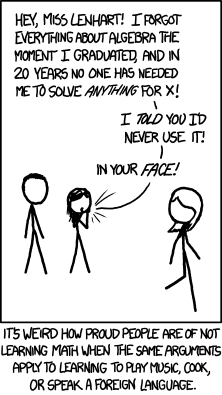Welcome to the course page of the Algebraic modal logic summer project at ILLC
Announcements
-
If you are interested in this project, please contact me (sumit.sourabh[at]gmail.com) by email.
Lectures
- Lecture 1: Introduction and overview of the course; order, posets, lattices, complete lattices, distributive lattices, down-sets, ideals, filters, boolean algebras (Chapters 1 and 2 of Davey and Priestley)
- Lecture 2: Join-irreducibles of a lattice, Birkhoff representation theorem for finite distributive lattices, Stone representation theorem for finite boolean algebras, Introduction to algebraic logic, Lindenbaum-Tarski algebras and algebraic completeness (Chapter 5 and 11 of Davey and Priestley)
- Lecture 3: Introduction to topology; Stone's representation theorem for infinite boolean algebras, Stone spaces (Chapters 5 and 6 of master's thesis by Mirte Dekkers available here)
- Lecture 4: Stone duality; Modal algebras, Lindenbaum-Tarski algebra for modal logic, Complex algebras (Section 5.1, 5.2 from BdeRV)
- Lecture 5: Jónsson-Tarski duality, Descriptive general frames, Modal spaces, Canonicity, Discrete duality (Section 5.3, 5.4, 5.5 of BdeRV)
- Lecture 6: Universal algebra: equational theory, variety,Birkhoff's theorem; Lattice of modal logics, Lattice of subvarieties of variety of modal algebras (Chapter 2 of Burris and Sankappanavar, addtional reference article)
Assignments
- Homework 1 (deadline 14 June, beginning of the lecture)
- Homework 2 (deadline 21 June, beginning of the lecture)
- Homework 3 (deadline 28 June)
Project topics
- Abstract algebraic logic
- W.J. Blok and D. Pigozzi, Algebraizable logics. Memoirs of the American Mathematical Society 396, vol. 77, 1989.
- Josep Maria Font, Ramon Jansana, and Don Pigozzi, A survey of Abstract Algebraic Logic, Studia Logica,74(1-2, Special Issue on Abstract Algebraic Logic II):13-97, 2003. [PDF]
- U. Rivieccio, What is Abstract Algebraic Logic?, Epistemologia, Rivista italiana di Filosofia della Scienza, XXXII (2009), pp. 173-196. [PDF]
- Kripke incompleteness
- W.J. Blok, The lattice of modal logics: an algebraic investigation, Journal of Symbolic Logic, 45:221-236, 1980. [PDF]
- F. Wolter and M. Zakharyaschev, Modal decision problems, in Handbook of Modal Logic, Elsevier, 2006. [PDF]
- Coalgebric modal logic
- Canonical extensions
- Domain theory
- S. Abramsky, Domain theory in logical form, Annals of Pure and Applied Logic, 51, (1991), 1-77.[PDF]
- Relational algebras
- R. Hirsch, I. Hodkinson, Complete representations in algebraic logic, J. Symbolic Logic, 62 (1997), 816-847. [PDF]
- R. Hirsch, I. Hodkinson, Games in algebraic logic: axiomatisations and beyond in: Stefan Bold, Benedikt Löwe, Thoralf Räsch, Johan van Benthem (eds.), Foundations of the Formal Sciences V, Infinite Games, Studies in Logic 11, College Publications, London, 2007, pages 157-185. [PDF]
- Algebraic proof theory
- H. Ono, Substructural logics and residuated lattices: an introduction, 50 Years of Studia Logica, Trends in Logic 21, V.F. Hendricks and J. Malinowski (eds.), Kluwer Academic Publishers, (2003), pp. 193-228. [PDF]
- A. Ciabattoni , N. Galatos and K. Terui, Algebraic proof theory for substructural logics: Cut-elimination and completions, Annals of Pure and Applied Logic, Volume 163, Issue 3, March 2012, pp. 266-290 [PDF]
General Information
Course Description
Algebraic logic is a discipline which uses tools and techniques from Universal algebra to study logic. Modal logic which is usually interpreted over relation structures or Kripke frames can also be seen as a Boolean algebra with operators (BAOs). The algebraic perspective adds a new dimension to the theory of modal logic. Starting from the seminal work of Jóhnsson and Tarski on representation of BAOs (1952), algebraic techniques have played an important role in modal logic.
This project is an introduction to algebraic modal logic. After the basics on BAOs and their representation, we'll see how duality theory unifies the relational and algebraic approaches to modal logic. As an application, we shall see proofs of some important results in modal logic, using algebraic techniques.
Organization
The first three weeks of the course will consist of introductory lectures by the instructor and exercise / discussion sessions, and will cover the following topics
- Introduction to Order theory, Universal algebra and Topology
- Introduction to algebraic logic: Boolean algebras as algebraic models for Propositional logic; algebraic semantics, completeness
- Stone duality for Boolean algebras; Priestley duality for distributive lattices
- Modal logic as a Boolean algebra with operators: completeness w.r.t. algebraic semantics; duality between frames and algebras; canonicity
- Applications:
- Sahlqvist completeness theorem
- Goldblatt-Thomason theorem
- Canonical extensions of BAO's
- Asymmetry between relational and algebraic semantics: Degrees of Kripke incompleteness
Staff
- Instructor: Sumit Sourabh (email: sumit.sourabh[at]gmail.com)
Dates/location
Wednesday and Fridays, 14 to 17, hrs in F2.01, Science Park 107Grading
This course is worth 6 ECTS. Students will work on exercise problems and submit homework every week. In the final week, they will give presentations and/or submit a paper on a topic related to the course. Participation in class discussion will also be assessed.Prerequisites
A basic knowledge of Modal logic is required. Familiarity with basic algebras such as groups, partial orders and lattices will be helpful.References
Order and Lattices
- Introduction to Lattices and Order by B.A.Davey and H.Priestley, second edition, Cambridge University Press, 2000.
- Notes on lattice theory - J. B. Nation: (Chapters 1-6,Chapters 7-12)
Algebraic modal logic
- Chapter 5 of Modal logic, Cambridge University Press, Cambridge, 2001 by P. Blackburn, M. de Rijke and Y. Venema.
- Algebra and Coalgebra by Yde Venema in Handbook of Modal logic available here.
Universal algebra
- A Course in Universal Algebra by S.Burris and H.Sankappanavar availble online.
